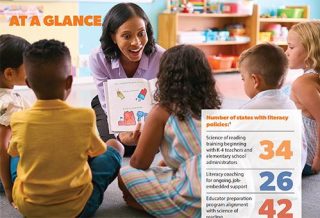RESEARCH
How assessment supports English learners
By Elizabeth Foster
Categories: Data, English learners, Outcomes, ResearchApril 2019
Vol. 40 No. 2
Read the remaining content with membership access. Join or log in below to continue.
Sed ut perspiciatis unde omnis iste natus error sit voluptatem accusantium doloremque laudantium, totam rem aperiam, eaque ipsa quae ab illo inventore veritatis et quasi architecto beatae vitae dicta sunt explicabo. Nemo enim ipsam voluptatem quia voluptas sit aspernatur aut odit aut fugit, sed quia consequuntur magni dolores eos qui ratione voluptatem sequi nesciunt. Neque porro quisquam est, qui dolorem ipsum quia dolor sit amet, consectetur, adipisci velit, sed quia non numquam eius modi tempora incidunt ut labore et dolore magnam aliquam quaerat voluptatem.
LET US HEAR FROM YOU. Do you have recommendations of research you’d like to see us cover? Email me at elizabeth.foster@lfstage.xyz.
RESOURCES
Here are resources that support educator learning about assessment and multilingual learners, with comments from Gottlieb.
Basterra, R., Trumbull, E., & Solano-Flores, G. (Eds.) (2011). Cultural validity in assessment: Addressing linguistic and cultural diversity. New York, NY: Routledge.
Black, P., Harrison, C., Lee, C., Marshall, B., & Wiliam, D. (2004). Working inside the black box: Assessment for learning in the classroom. Phi Delta Kappan, 86(1), 8-21.
- Discussion of the importance of teacher-student interaction and of educators knowing students well as an aspect of assessment.
Earl, L.M. (2013). Assessment as learning: Using classroom assessment to maximize student learning. Thousand Oaks, CA: Corwin.
- Focused on assessment as a strategy for daily classroom learning as well as student measurement.
González, N., Moll, L.C., & Amanti, C. (2005). Funds of knowledge: Theorizing practices in households, communities, and classrooms. New York, NY: Routledge.
- Highlights how sources of cultural knowledge among families and communities can be brought into the work of schools. See www.youtube.com/watch?v=aWS0YBpGkkE.
Hornberger, N.H. (2002). Multilingual language policies and the continua of biliteracy: An ecological approach. Language Policy, 1(1), 27-51.
- An examination of the impact policies that support multilingualism have had in South Africa and Bolivia, with implications about education in the United States.
García, O., Johnson, S.I., & Seltzer, K. (2016).The translanguaging classroom: Leveraging student bilingualism for learning. Philadelphia, PA: Caslon Publishing.
- Language practices to draw on students’ bilingualism to support their engagement with complex academic texts and advance social justice.
Soltero-González, L., Sparrow, W., Butvilofsky, S., Escamilla, K., & Hopewell, S. (2016). Effects of a paired literacy program on emerging bilingual children’s biliteracy outcomes in third grade. Journal of Literacy Research, 48(1), 80-104.
- This longitudinal study examines whether the implementation of a Spanish-English paired literacy approach provides an academic advantage to emerging bilingual students over a sequential literacy approach.
References
de Brey, C., Musu, L., McFarland, J., Wilkinson-Flicker, S., Diliberti, M., Zhang, A. … Wang, X. (2019). Status and trends in the education of racial and ethnic groups 2018 (NCES 2019-038). Washington, DC: National Center for Education Statistics.
Learning Forward. (2011). Standards for Professional Learning. Oxford, OH: Author.

Elizabeth Foster is the senior vice president of research and strategy at Learning Forward. She leads the organization’s research efforts for partnerships, programs, and fundraising. Elizabeth co-wrote the Standards for Professional Learning (2022) with Tracy Crow and now facilitates learning sessions about the standards and develops resources that support their use and implementation.
Categories: Data, English learners, Outcomes, Research
Recent Issues
LEARNING TO PIVOT
August 2024
Sometimes new information and situations call for major change. This issue...
GLOBAL PERSPECTIVES
June 2024
What does professional learning look like around the world? This issue...
WHERE TECHNOLOGY CAN TAKE US
April 2024
Technology is both a topic and a tool for professional learning. This...
EVALUATING PROFESSIONAL LEARNING
February 2024
How do you know your professional learning is working? This issue digs...










